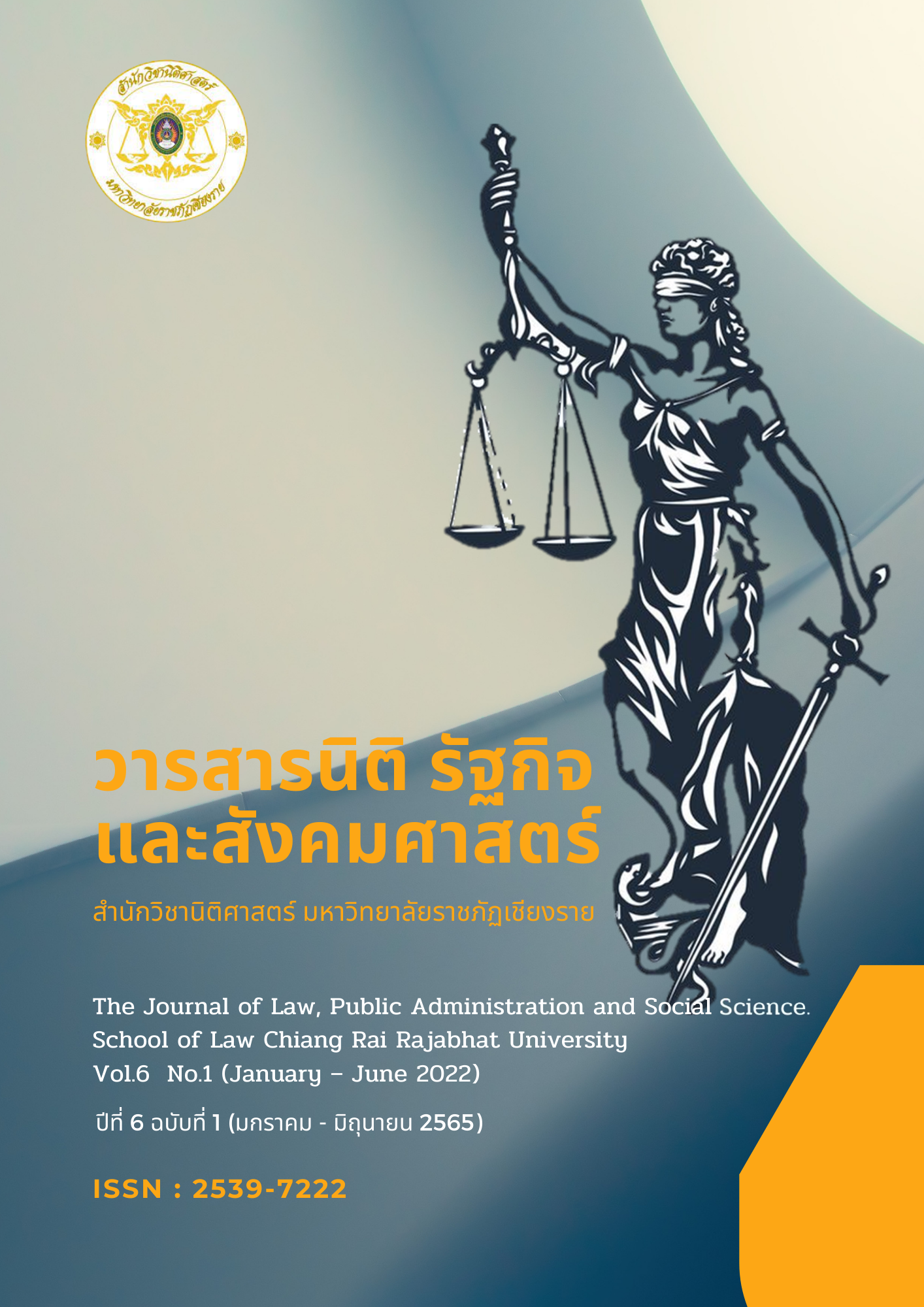กรอบกฎหมายเพื่อกำกับดูแลการท่องเที่ยวเชิงนิเวศภายใต้หลักการยั่งยืนเชิงนิเวศ
Main Article Content
บทคัดย่อ
งานชิ้นนี้เป็นการศึกษาวิจัยเชิงสหวิทยาการ ซึ่งบูรณการความรู้ด้านการจัดการ
การท่องเที่ยว นิเวศวิทยาประยุกต์และกฎหมายที่เกี่ยวข้อง กำหนดระเบียบวิธีวิจัยผ่านนิติวิธีเพื่อนำเสนอกรอบกฎหมายการกำกับดูแลการท่องเที่ยวเชิงนิเวศภายใต้หลักการอย่างยั่งยืน
เชิงนิเวศ โดยศึกษาประเด็นการขยายตัวเชิงพื้นที่ของภาคการท่องเที่ยว ด้านการใช้ประโยชน์ที่ดินอันเป็นแหล่งทรัพยากรท่องเที่ยวธรรมชาติที่อาจส่งผลกระทบต่อการสงวนรักษาพื้นที่สาธารณะประโยชน์ที่มีคุณค่าทางระบบนิเวศในหลายพื้นที่ของประเทศ
ผลการวิจัยพบประเด็นสำคัญดังต่อไปนี้ (1) การใช้ประโยชน์ที่ดินพัฒนาเป็นแหล่งท่องเที่ยวเชิงนิเวศมีจำนวนเพิ่มมากขึ้นอย่างต่อเนื่องทั่วประเทศ เป็นที่ดินเอกชนที่ชอบด้วยกฎหมาย 11% และ 89% เป็นที่ดินของรัฐและที่ดินสาธารณะประโยชน์ ในจำนวนแหล่งท่องเที่ยวฯ ในที่ดินภาครัฐแบ่งย่อยเป็น (ก) ภายใต้กระทรวงทรัพยากรธรรมชาติและสิ่งแวดล้อม ซึ่งเป็นพื้นที่อนุรักษ์ 46% และ (ข) เป็นพื้นที่สาธารณะประโยชน์ภายใต้กระทรวงมหาดไทย เช่น องค์กรปกครองส่วนท้องถิ่น 42% และอื่นๆ 1% เช่น กองทัพเรือ และโครงการในพระราชดำริ (2) การกำกับดูแลแหล่งท่องเที่ยวเชิงนิเวศมีแนวทางการปฏิบัติ
ที่แตกต่าง แม้จะอยู่ในชีวภูมิศาสตร์เดียวกัน ความแตกต่างนี้ถูกแบ่งแยกโดยลักษณะหลักเขตแดน ซึ่งตัดขาดจากกันไปตามเขตปกครอง ผู้ดูแลมีอำนาจการตัดสินใจเด็ดขาด โดยมุ่งส่งเสริมด้านเศรษฐกิจสังคมชุมชน นันทนาการและความพึงพอใจของนักท่องเที่ยว แต่ขาดการส่งเสริมความรู้ด้านการอนุรักษ์ฟื้นฟูระบบนิเวศอย่างจริงจัง มีการก่อสร้างโครงสร้างถาวร สถานที่พัก เครื่องเล่น โดยเฉพาะในพื้นที่ขององค์การปกครองส่วนท้องถิ่น (3) ปัญหาสัตว์ป่ากับชาวบ้านตามแนวพื้นที่รอยต่อ ดังนั้นการไม่มีระเบียบข้อบังคับที่รัดกุมในการกำกับดูแลมาตรฐานกิจกรรมท่องเที่ยวเชิงนิเวศ ผลักดันไปสู่ปัญหามลพิษปนเปื้อนสู่ระบบนิเวศโดยเฉพาะในพื้นที่สาธารณะ และสูญเสียความหลากหลายทางชีวภาพดั้งเดิม โดยนำเข้าสัตว์และพืชต่างถิ่น
ดังนั้นในระยะยาวระบบนิเวศจะล้มสลายและไม่สามารถดึงดูดนักท่องเที่ยวได้และถูกทิ้งร้าง ดังนั้นการใช้ประโยชน์นิเวศทางบกด้านการท่องเที่ยวเชิงนิเวศที่ผ่านมาจึงไม่สอดคล้องตามเป้าหมายการพัฒนาอย่างยั่งยืนที่ 15


